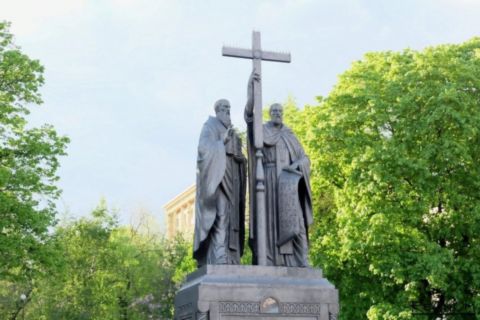Day of Slavonic Alphabet and Culture is of special importance for preserving national identity and cultural code of the Slavonic peoples. This event is inseparably associated with the names of distinguished educators — Saints Cyril and Methodius, Equals to the Apostles and creators of the Slavonic alphabet. Their activity laid the foundation of writing and spiritual development of the Slavonic world. On the eve of this holiday, Professor, Head of the Department of the Russian Language and Literature of the SUSU Institute of Media, Social Sciences and Humanities Tatiana Semian talked about the Slavonic writing system and about the university's tradition to celebrate this day.
— What is the origin of the Day of Slavonic Alphabet and Culture, and why namely Saints Cyril and Methodius serve as symbolic figures of this holiday?
— Every year on May 24th, the Day of Slavonic Alphabet and Culture is celebrated in Russia and other Slavonic countries. We turn to the origins of our culture and pay a tribute to the first teachers of the Slavonic people — Saints Konstantine (Cyril in monasticism) and Methodius, brothers, Equals to the Apostles and creators of the first Slavonic alphabet, teachers of Christianity, and the first translators of prayer books from Greek to Old Slavonic.
Already back in the ancient times, the Slavonic peoples had honored the memory of these two brothers. But later this tradition was lost due to certain historical and political circumstances. In our country, celebration of this holiday resumed in 1986, and in 1991 it was assigned a status of a national holiday.
It is difficult to overestimate the role of the great Slavonic educators. They brought writing system to the lands of Moravia and introduced the world culture to the numerous Slavonic peoples. Works by the Thessalonica brothers became a heritage of all the Slavs and laid the foundation of their intellectual and spiritual development.
— What main stages of development of the Slavonic writing system on the way towards modern Russian written language can be distinguished?
— Since the moment the writing system appeared in Rus', it was developing and changing. Along with the Cyrillic uncial style of calligraphy (characterized by strict typeface and absence of blank spaces), another type of Cyrillic writing, called semi-uncial, appeared later. Letters became slanted and words were partially separated by spaces. Some time later, cursive writing emerged, which our Russian handwriting tradition originates from. Over time, the materials on which people wrote also changed: in everyday life people used birchbark for correspondence, while books and documents were written on expensive book-fell, later replaced by paper.
Alphabet altered as well. The thing is that the language of the East Slavs has significantly changed over the last one thousand years. The pronunciation of certain sounds changed and some were lost altogether, and the writing system could not keep up with those changes. As a result, a need arose to reform the alphabet so that it more adequately reflected the specifics of the phonetics of the Russian language known as the language of Rus'. So, early in the 18th century, Emperor Peter the Great held the first reform of the Russian writing, thanks to which the so-called civil type was introduced and used for printing of secular books.
— Is it true that Russian is the most wide-spread one among Slavic languages?
— Yes, it is. According to research studies, the Russian language holds the first place among other Slavic languages as per the number of its speakers. The second place belongs to Ukrainian, and the third place — to Polish. The leading positions of Russian can first and foremost be explained by the fact that it has been and still remains a language of interethnic communication, one of the official languages of the United Nations and one of national languages in all republics of the Russian Federation.
— How does the attitude of students to the Russian language and literature change?
— Students enrolling in our Department usually treat their native language and literature with respect. And our task is to foster this attitude in them further and teach them how to assess and interpret linguistic facts from the scientific point of view.
— Could you please share on the traditional events held by the Department to celebrate the Day of Slavonic Alphabet?
As the tradition goes, every year our Department of the Russian Language and Literature organizes a brain game, in which students of the second-year of study take part. In this team competition, students answer questions on the history of the Russian language and Slavonic writing system. And also on this day, an online quiz is held on the official web page of the Department of the Russian Language and Literature, SUSU Philologists, where all those willing can become participants. In addition, a contest on literary translation is organized on the occasion of this holiday and the results are announced on the day of celebration. The main goal of all these events is the popularization of the knowledge of the history of the Russian language. We believe that it is important to show that learning Russian can be interesting, fascinating, and not boring at all.




